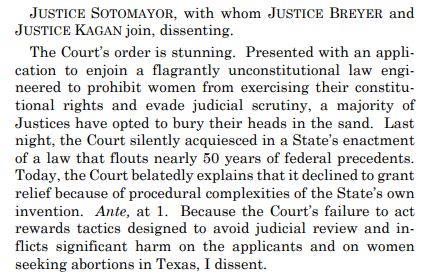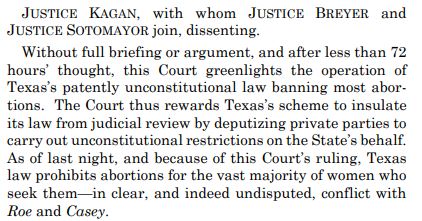In an unsigned 5-4 shadow docket ruling that occurred late Wednesday night, the Supreme Court opted to let the new Texas law slide through.
The ruling had nothing to do with personal beliefs but rather due to a lack of legal backing.
It states that “To prevail in an application for a stay or an injunction, an applicant must carry the burden of making a ‘strong showing’ that it is ‘likely to succeed on the merits,’ that it will be ‘irreparably injured absent a stay,’ that the balance of the equities favors it, and that a stay is consistent with the public interest.”
The shadow docket allows the court to make decisions in an accelerated fashion without providing signed opinions or detailed explanations.
The court’s order does not prevent the law from being further challenged or repealed, and they noted that no decision was made on the merits of the law. They acknowledge that the case raises “serious questions” but that the petitioners have not done the proper due diligence to move the case forward through the Supreme Court.
“The applicants now before us have raised serious questions regarding the constitutionality of the Texas law at issue. But their application also presents a complex and novel antecedent procedural questions on which they have not carried their burden.”
It also states that “In particular, this order is not based on any conclusion about the constitutionality of Texas’s law, and in no way limits other procedurally proper challenges to the Texas law, including in Texas state courts.”
Chief Justice John Roberts is adamant that this ruling does not mean the courts agree the law is constitutional, but that they would rule on the constitutionality of the law when the proper question is presented to them.
He is one of the four justices who dissented, joining Stephen Breyer, Sonia Sotomayor, and Elena Kagan in their opposition.
Justice Sotomayor is making waves on social media for stating that the justices who voted to let the law stay intact “have opted to bury their heads in the sand.”
She states that “Because the Court’s failure to act rewards tactics designed to avoid judicial review and inflicts significant harm on the applicants and on women seeking abortions in Texas, I dissent.”

She further states that the law is unconstitutional, though Chief Justice Roberts avoided a personal verdict on this.
Justice Sotomayor claims that the state’s wording allowed them to work around federal law and make it more difficult to shoot down. “It cannot be the case that a State can evade federal judicial scrutiny by outsourcing the enforcement of unconstitutional laws to its citizenry.”
Justice Kagan accuses Texas of a scheme and that the other Justice’s blind approval paves the way for unconstitutional restrictions. “The Court thus rewards Texas’s scheme to insulate its law from judicial review by deputizing private parties to carry out unconstitutional restrictions on the State’s behalf.”
She took it even further, accusing the majority of hastily reviewing “only the most cursory party submissions.”

She says that the conclusion was barely explained and that, “The majority’s decision is emblematic of too much of this Court’s shadow-docket decision making—which every day becomes more unreasoned, inconsistent, and impossible to defend.”
Americans are as divided as the Justices over their judgment.
One Twitter user posed a hypothetical question on how the law could translate when guns are involved.
Question on last nights Supreme Court “Shadow docket ruling”
Could another state, let’s say New Jersey, rewrite the Texas law that if someone is killed by GUN violence, the Gun Companies (an analog to reproductive providers) could be sued by ANYONE out of state in Civil court?
— Jeffrey “No Handmaids Tale for TX or USA” Belk (@jkbelk) September 2, 2021
Another user pointed out the hypocrisy of those who support the law but also oppose mandatory vaccinations.
Texas: I reserve the right not to get vaccinated because it’s my body!
Also Texas: women shouldn’t get to choose what to do with their bodies! #TexasAbortionLaw
— 🦋Amanda (@xvenus__) September 1, 2021
Meanwhile, this user shared a meme that is the opposite side of the same coin.
The Left: “Governments should not dictate what a woman may do with her body.”#TexasAbortionLaw pic.twitter.com/6DGhN1lXu1
— Solo Lobo (@Solo_Lobo_) September 2, 2021
Other users acknowledge that the Supreme Court decision is based on law, no matter what anyone may feel.
I'm not sure if you are aware, but the Supreme Court wasn't designed to render decisions based on public support, but based on constitutionality. https://t.co/OHXKee1Q21
— Matthew Kolken (@mkolken) September 2, 2021
Social media users presented extreme hypothetical situations that would be viable under the new Texas law, like a rapist impregnating a young girl then collecting $10,000 after snitching on those who help her get an abortion.
Critics argue that the law is harsh as it not only excludes rape and incest victims, but many women aren’t even aware that they are pregnant at the six-week mark.
It also begs bigger questions to be asked: When does an American have the right to govern their own body? Does this set a precedent for other laws to pass sneakily? What’s the difference between abortion and vaccine rights? How will this affect other laws? Will other states follow suit?
With Mississippi’s new 15-week abortion law due on the chopping block later this year, we’re sure to hear more from the Supreme Court on this issue.
Follow Riiver Nihil: Gettr Instagram
Follow Tatum Report: Gettr Instagram Twitter Facebook
- West Point Reimposes Rules on Unvaxxed Cadets - January 31, 2023
- Warroom Host Claims Mother Jones Magazine Publishes Chinese Propaganda - January 31, 2023
- CCP Allegedly Weaponizing the DOJ - January 25, 2023





